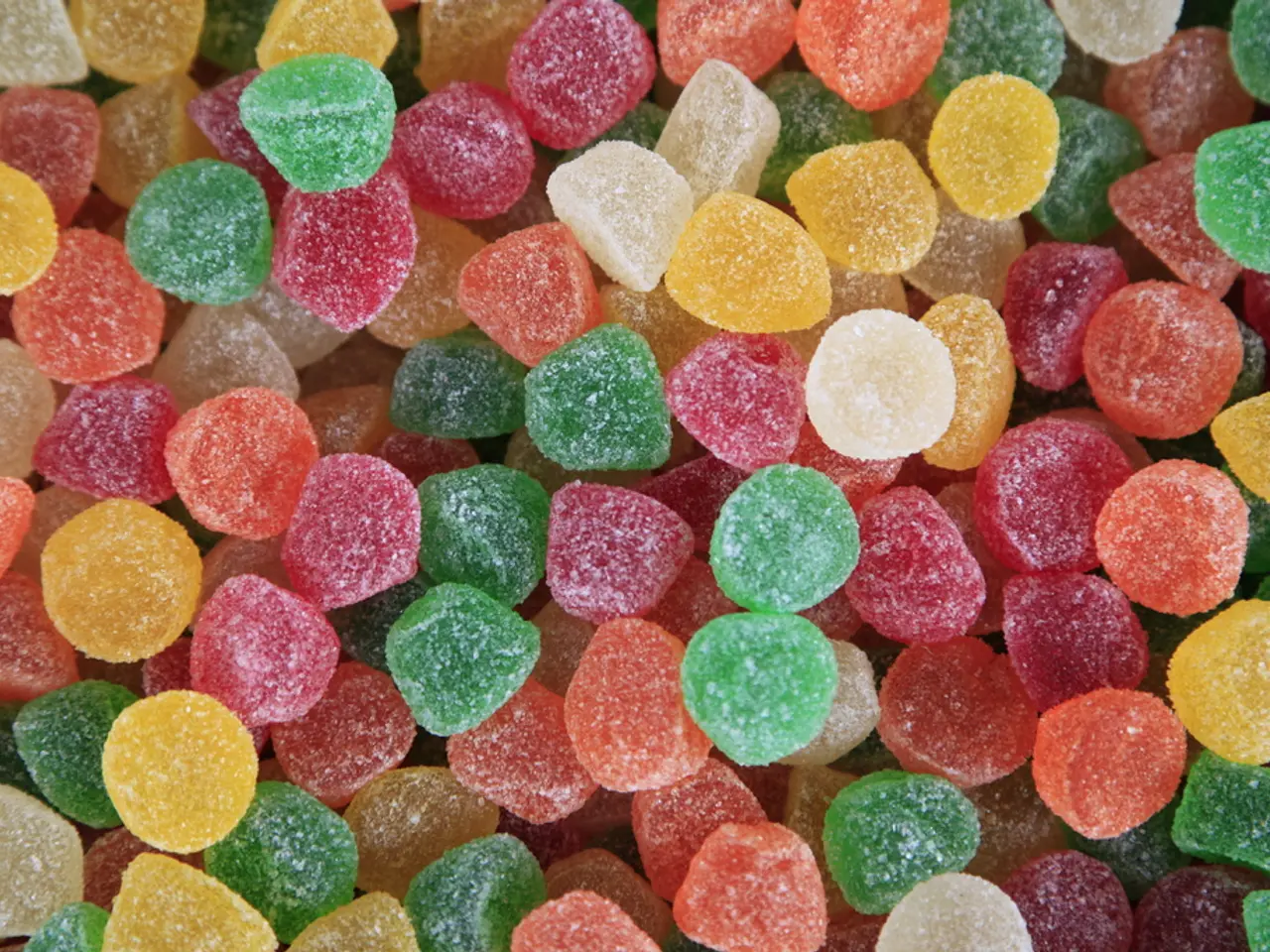Sugar Alcohols: Classification, Advantages, and Drawbacks
In the world of sweeteners, sugar alcohols have gained popularity as a healthier alternative to traditional sugar. These substances, also known as polyols, are naturally found in a variety of plants such as strawberries, mushrooms, and onions, or can be manufactured from fructose or dextrose derived from cornstarch.
Sugar alcohols, such as sorbitol and mannitol, are approximately 60 percent as sweet as regular sugar. They offer several potential health benefits, but also carry some risks, primarily related to digestion.
One of the key advantages of sugar alcohols is their lower impact on blood sugar. Because they are only partially absorbed by the body, they tend to cause smaller and slower rises in blood sugar levels compared to regular sugar. This makes them suitable for people with diabetes and for blood sugar control in general. Additionally, sugar alcohols provide fewer calories and carbohydrates, which can aid in weight management and reduce overall caloric intake.
Certain sugar alcohols, such as xylitol, have been shown to reduce the risk of tooth decay by inhibiting the growth of cavity-causing bacteria. This is why xylitol is common in sugar-free gums and dental products. Preliminary research also suggests that some sugar alcohols may promote a healthy gut by supporting beneficial bacteria, though more research is needed in this area.
However, consuming large amounts of sugar alcohols could result in gastrointestinal issues such as bloating, gas, and diarrhea due to fermentation by gut bacteria. Sorbitol and mannitol are especially known for these effects. It is important to note that foods with sugar alcohols may be labeled "sugar-free" but still contain carbohydrates that can affect blood sugar.
People with irritable bowel syndrome (IBS) may find that sugar alcohols provoke symptoms. Additionally, many products containing sugar alcohols tend to be highly processed, which could contribute to increased appetite, weight gain, and risks associated with diabetes if consumed frequently.
When consumed in moderation, sugar alcohols can be a useful alternative sweetener with benefits for blood sugar control, weight management, and oral health. However, excessive intake can cause digestive discomfort. People with diabetes or those managing their weight should still monitor total carbohydrate intake from these sweeteners and be cautious of processed foods containing them.
Key sugar alcohols like xylitol may offer unique benefits, but others (e.g., sorbitol) may have a higher risk of gastrointestinal side effects. Reading labels and moderating consumption is essential to maximize benefits and minimize risks.
The number of calories in sugar alcohols varies: Sorbitol (2.6 calories/g), Mannitol (1.6 calories/g), Maltitol (2.1 calories/g), Hydrogenated starch hydrolysates (3 calories/g), Erythritol (0-0.2 calories/g), Xylitol (2.4 calories/g), Isomalt (2.0 calories/g), Lactitol (2.0 calories/g). Isomalt is made from sugar and only tastes around 55 percent as sweet, while Maltitol is made using maltose from cornstarch and tastes around 75 percent as sweet as regular sugar. Lactitol is made from whey and tastes about 35 percent as sweet as regular sugar.
Erythritol is produced from cornstarch through a fermentation process and tastes about 70 percent as sweet as regular sugar. Xylitol can be made from various materials, including birch wood, corncobs, and leftover sugar cane stalks. It is just about as sweet as regular sugar and has a cooling, minty taste.
Sugar alcohols can be found in a variety of products, including baked goods, candies, chewable vitamins, chocolates, cough drops, cough syrups, drinks, frostings, gums, ice cream, jellies, mouthwashes, puddings, toothpastes, and more. The sweetness of hydrogenated starch hydrolysates depends on their makeup, but the range is about 20 to 50 percent that of regular sugar.
In summary, sugar alcohols offer a potential alternative to traditional sugar with benefits for blood sugar control, weight management, and oral health. However, excessive intake can cause digestive discomfort, and it is important to read labels and be mindful of the amount of sugar consumed. For people with IBS or those managing their weight, moderation is key to maximize benefits and minimize risks.
- Sugar alcohols like sorbitol and mannitol, approximately 60 percent as sweet as regular sugar, are derived from a variety of plants and can be manufactured from fructose or dextrose.
- Due to their lower impact on blood sugar, sugar alcohols provide benefits for people with diabetes and blood sugar control in general.
- By offering fewer calories and carbohydrates, sugar alcohols can aid in weight management and reduce overall caloric intake.
- Certain sugar alcohols, such as xylitol, can help reduce the risk of tooth decay and inhibit the growth of cavity-causing bacteria.
- Consuming large amounts of sugar alcohols, especially sorbitol and mannitol, could result in gastrointestinal issues like bloating, gas, and diarrhea.
- People with IBS may find that sugar alcohols provoke symptoms, and highly processed products containing them could increase appetite, weight gain, and risks associated with diabetes.
- When consumed in moderation, sugar alcohols like xylitol can provide benefits for blood sugar control, weight management, and oral health while minimizing risks.
- The number of calories in sugar alcohols varies significantly, with erythritol having nearly zero calories and xylitol being just about as sweet as regular sugar.
- Sugar alcohols can be found in various products, such as baked goods, chocolates, cough drops, toothpastes, and more, making them a common ingredient in the global cuisines and healthy cooking lifestyle.




